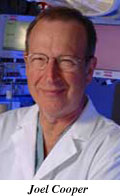

|
Joel Cooper: “Father of Lung Transplant”—
|
 |
Nearly a quarter-century ago, Dr. Joel Cooper became the first surgeon in the world to successfully complete a lung transplant. Dr. Cooper is now a renowned lung surgeon, known for his pioneering techniques and progress in the treatment of lung disease, especially emphysema.
Dr. Cooper became chief of the Division of Thoracic Surgery at UPHS last month. He will also teach at the School of Medicine as a professor of surgery.
“Dr. Cooper brings so much more to Penn than just his national and international reputation. He is a spectacularly talented surgeon who has tremendous experience with all manner of complex chest operations,” said Dr. Larry R. Kaiser, chair of the department of surgery at Penn and a protégé of Dr. Cooper’s. “He is a tremendous addition to the Philadelphia and entire Mid-Atlantic region medical community.”
At Penn, Dr. Cooper will continue to refine his work in lung-volume reduction surgery, the only treatment short of a transplant to restore lung function in patients with late-stage emphysema. Dr. Cooper will also examine the use of a new, cutting-edge, non-surgical procedure called “airway bypass” (or “lung stenting”) to treat the irreversible lung disease of emphysema. This procedure holds promise for patients who have no other options.
Emphysema, most often brought on by smoking, affects an estimated three million Americans and destroys the lung’s “elastic recoil.” The lungs can no longer deflate to let air in. The patient is in a permanent state of “breathlessness,” sucking in rapid, shallow breaths.
But in this new minimally invasive procedure, airway bypass stent placement, Dr. Cooper can actually puncture the lung a few times from the inside. This lets air out, so that the over distended lung can then retract—to let more air in. It deflates the lungs, essentially creating a few new unobstructed air pathways, so that the patient can breathe more easily.
This procedure will utilize drug-eluding stents to keep the new holes open and is an alternative to a lung transplant or volume reduction surgery. It is not yet FDA approved in the United States. Dr. Cooper is now working to get approval to begin a clinical trial on the procedure here at Penn.
“Penn has a tremendously distinguished history and is a very exciting place academically,” said Dr. Cooper about coming to Philadelphia. I already have some connections in the department of surgery and will be working with five other thoracic surgeons; that’s one of the largest groups of thoracic surgeons in the United States. I’m excited to be located on the East Coast so that these special procedures and treatments will provide a unique service to a large population center.”
“I also want to join a major training program so that I can help train the next generation of thoracic surgeons,” Dr. Cooper adds. “I want to build on our existing program and further enhance and expand the program for lung cancer and emphysema patients—to expand our list of innovative treatments here to be able to offer to our patients.”
Most recently, Dr. Cooper served as a professor of surgery and chief of the Division of Cardiothoracic Surgery at Washington University and Barnes-Jewish Hospital in St. Louis. Before that, he was a professor in the department of surgery at the University of Toronto.
